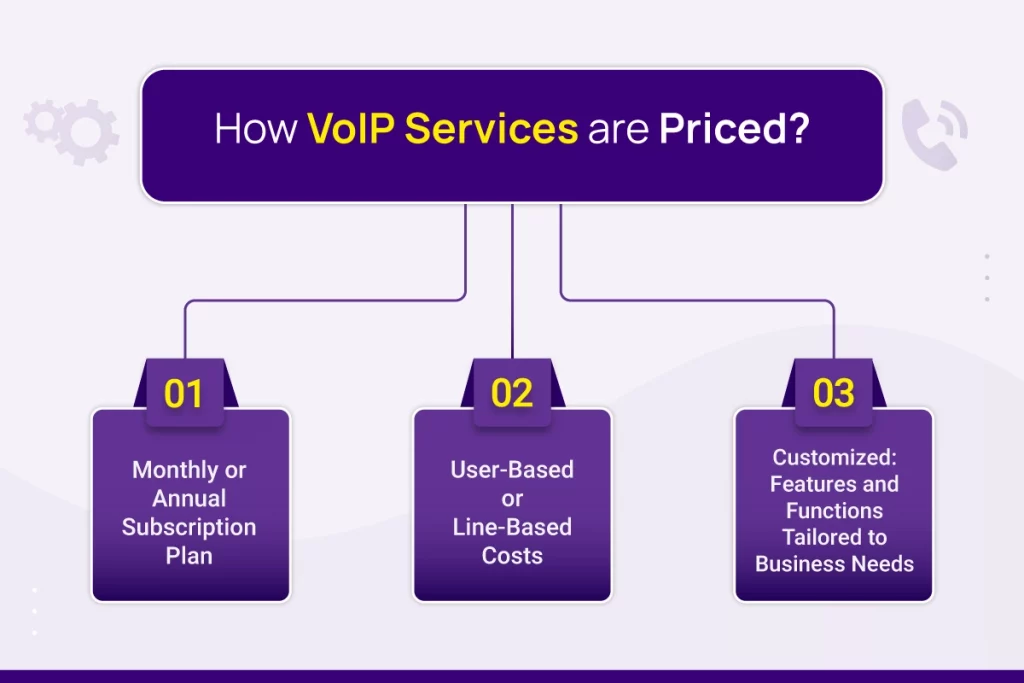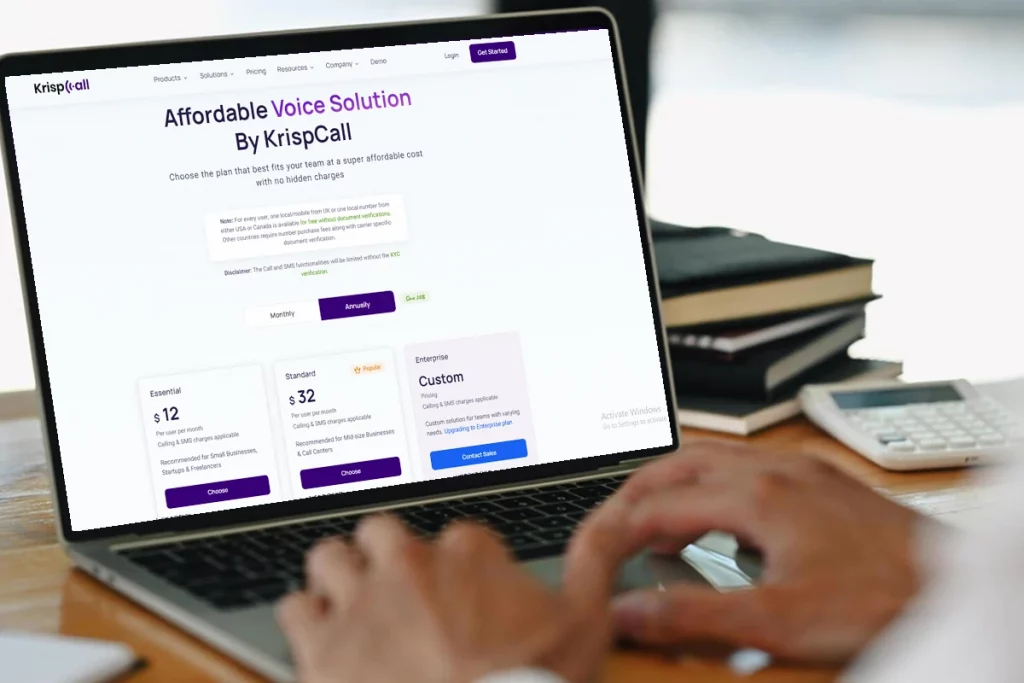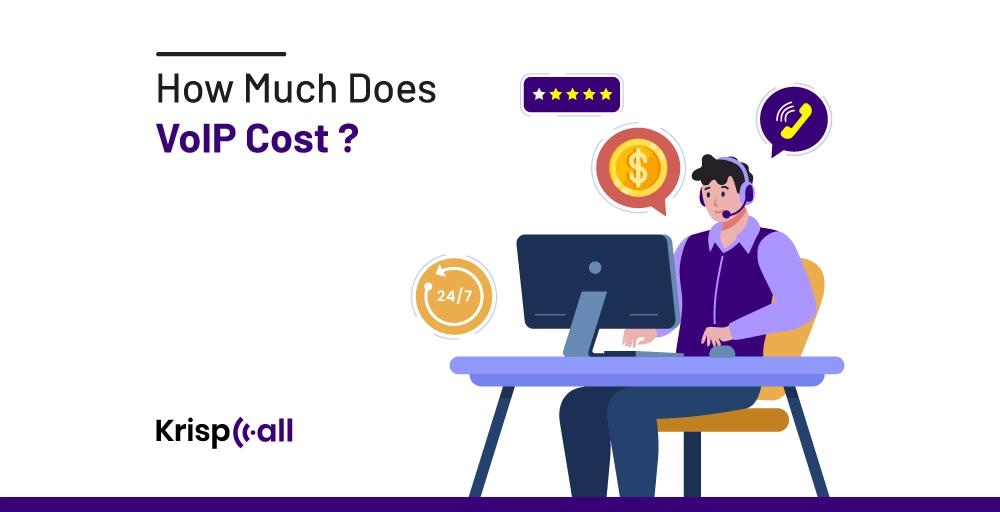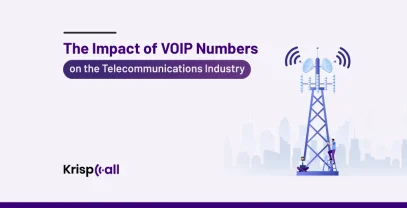Are you tired of navigating through the maze of VoIP costs💰, feeling uncertain about hidden fees, and struggling to find the best value for your budget?
It’s time to simplify your search and discover a transparent solution that meets your communication needs without overspending.
In this blog, we’ll help you explore different providers, their prices, and reliability. We’ll discuss factors affecting costs and offer tips for making smart financial decisions for your business. 💡
🔑KEY HIGHLIGHTS
- The average cost for a VoIP phone system range between $10 to $45 per line per month.
- VoIP services are priced based on subscription plans and user needs, with options for monthly or annual payments and customization, potentially including one-time setup fees.
- Long-term VoIP contracts can save money, but businesses need to be mindful of potential hidden fees and usage limits to ensure they align with their requirements.
- Investing in VoIP with KrispCall offers cost savings and enhanced communication, proving valuable for modern businesses.
Let’s get started🚀
How much does VoIP Cost?
According to industry experts, the average cost for a VoIP phone system range between $10 to $45 per line per month. VoIP services are more cost-effective than traditional phone services but still come with expenses, including provider fees and the need for reliable high-speed internet.

When evaluating the cost of Voice over Internet Protocol (VoIP) systems, it’s essential to consider various factors like the number of users, setup requirements, necessary network upgrades, and any optional hardware purchases.
Costs can vary🤑 depending on the provider and specific business needs, so careful evaluation is essential for optimal investment. To make things easier for you, we’ve done the tough work for you and sorted out the best VoIP Service Provider based on the following factors:
- Provided Features
- Subscription Pricing
- Compatibility with Devices
- Service Quality
- Support Offered
| Providers | Annual Plan (if billed annually) | Monthly Plan | Features |
| KrispCall | $12 to $32 per user per month | $15 to $40 per user per month | Global Calling, Call Log History, Call Forwarding, Multimedia Messaging, and Unified Callbox. |
| Google Voice | $6 to $18 per user per month, 1-year commitment | $6 to $18 per user per month, 1-year commitment | Meet Video and voice conferencing, US or international dial-in phone numbers, Digital whiteboarding, Noise cancellation, Meeting recordings saved to Google Drive |
| Intermedia Unite | $27.99 to $32.99 per user per month | $27.99 to $32.99 per user per month | Phone, live chat, email, faq/knowledgebase, social media, video tutorials/webinar |
| RingCentral | $20 to $35 per user per month | $30 to $45 per user per month | Visual voicemail, Team Messaging, Document sharing, Call management, Call log reports, Voicemail-to-email, Unlimited audio conferencing, Call Recording |
| Zoom Phone | $120 to $240 per year per user | $10 to $20 per month per user | Domestic Calling in Selected Country, International Calling, One Management Portal, SMS & MMS, Multiple Device Use, Optional Add-on, Direct Dial Number |
| Nextiva | $17.95 to $31.95 per user per month (No. of users = 100+) | $24.95 to $39.95 per user per month (No. of users = 100+) | Unlimited voice & video calling, Voicemail, Toll-free numbers, Outlook/Google Contacts Integrations, Unlimited internet fax, Auto attendant (multi-level), Salesforce/HubSpot Integrations |
| GoTo | $27 to $32 per user per month | $27 to $32 per user per month | Unlimited users, Customizable auto attendants, call routing, and call queues, Video meetings with up to 250 participants, Integrations like Salesforce, Miro and more, 80 SMS credits per seat, per month |
| Avaya | $20 to $35 per user per month | $25 to $32 per user per month | Unlimited calls within US/CA, Business SMS, Voicemail transcription, Team messaging, No limit on number of users, Unlimited audio conferencing, Popular integrations including 365, G Suite, Slack and more |
| Dialpad | $15 to $25 per user per month | $23 to $35 per user per month | Unlimited calling, SMS, MMS & team messaging, 24/7 live agent support, CRM integrations (Salesforce, Zendesk, HubSpot, Zoho & more) |
| OpenPhone | $15 to $23 per user per month | $19 to $33 per user per month | Voicemail transcripts, Group calling, Call transfers, AI call summaries and transcripts, HubSpot and Salesforce integrations, Analytics and reporting |
How VoIP Services are Priced?
VoIP services are priced based on your chosen subscription plan and provider, considering factors like the number of users, features, and communication channels.
The main factors that influence the VoIP Pricing are:

1. Monthly or Annual Subscription Plan
Most of the cost of VoIP phone service comes from subscription fees💸, which you pay monthly or yearly. These fees cover the basic service, letting your business make and receive calls📞 over the Internet. Subscription plans vary, from basic ones with standard features to more expensive ones with extra functions.
Monthly Plans
A monthly plan provides flexibility and avoids long-term commitments, making it suitable for small businesses. These plans offer a predictable and manageable way to budget for your business communication needs. However, over time, they can become more costly compared to annual plans.
Annual Plans
Annual plans offer an alternative pricing structure, providing benefits such as discounted rates, predictable budgeting, and potential contractual benefits. However, they lack👎 flexibility and may have early termination fees. To decide if an annual plan is right for you, consider your budget, flexibility needs and compare offers from different providers carefully.
2. User-Based or Line-Based Costs
VoIP providers set prices based on the number of users or lines you need. So, the more employees or phone lines you have, the more it’ll cost. It’s important to figure out exactly how many users or lines your business needs✔️ to avoid paying too much. When deciding between user-based and line-based pricing, consider things like how big your business is, how many calls you make, and what kind of communication you need.
User-Based Pricing
With user-based pricing, the cost is determined by the number of users who will have access to the VoIP service. Each user typically has their own account or extension, and the pricing scales up📈 or down based on the number of users. This model is often used for businesses where each employee needs their own phone line or extension.
Line-Based Pricing
This model charges a fixed monthly fee for a set number of lines or phone numbers, with costs varying based on the provider and included lines. It is ideal for businesses with a few users who make frequent calls, as the cost remains the same regardless of individual usage. However, it lacks flexibility for scaling, may result in unfair cost distribution among users, and can make budgeting less predictable due to fluctuating costs based on active calls.
3. Customized: Features and Functions Tailored to Business Needs
Customizing VoIP plans help businesses match their communication needs precisely, going beyond basic functions like calling and voicemail. These customized plans might cost extra on top of the base price. However, by carefully figuring out needs and talking with providers, businesses can handle their communication needs within budget😊.
Standard Features
The standard subscription package usually includes Basic VoIP features like call forwarding, voicemail, and calling within the country. With this package, businesses often enjoy unlimited incoming and outgoing calls nationwide.
Advanced Features
Advanced features are available, often at an additional cost, for businesses requiring more robust capabilities. These include features like Customer Relationship Management (CRM) integration, advanced analytics📊, unlimited calling, international calls, and premium customer support.
Set Up Cost
Some providers might charge a one-time set-up cost to cover the initial activation and configuration of your VoIP service. This cost can vary depending on the complexity of your setup and the provider’s policies.
By understanding these different cost components and how they work together, you can choose the right VoIP service for your smooth business communication without overspending.
How Long-Term Agreements Impact VoIP Costs?
Long-term agreements, such as signing up for annual or multi-year plans, can significantly impact VoIP costs. Therefore, it is important to thoroughly understand the terms of the agreement before making any decisions.
Contract Duration: Monthly vs. Long-Term Commitments
Monthly Plans offer flexibility and lower initial commitment. They are ideal for businesses unsure of their long-term needs or wanting to avoid being locked🔒 into a specific provider. However, monthly plans often come with higher per-user costs compared to long-term contracts.
On the other hand, long-term commitments usually offer discounted rates and possibly extra perks like free hardware or extended customer support. Yet, they can tie you to a particular plan and provider, which might make it harder to adjust to changing needs or switch to better deals from other providers.
Cancellation Charges
Cancellation charges, often referred to as Early Termination Fees (ETFs), are crucial to consider when evaluating long-term contracts for VoIP services. These fees are penalties imposed by the provider if you choose to terminate⛔ your contract before the end of its agreed-upon term.
For example, if you cancel a 12-month agreement after only six months, you might face charges for the remaining balance.
While long-term contracts can offer cost savings, understanding and potentially negotiating cancellation charges is essential to avoid unexpected financial burdens.
Service-Level Agreements
Service-level agreements (SLAs) are contracts between you and your VoIP provider. They detail the quality and reliability of the service you can expect.
For example, SLAs may specify metrics like uptime percentage, call quality standards, and response times for technical support. Understanding SLAs is important because they make sure your VoIP service meets your business’s communication needs reliably.
Usage Restrictions or Limits
VoIP plans often have usage limits to consider. These can include restrictions on call minutes, concurrent calls, international calling, data usage, and features like video conferencing or call recording.
Exceeding these limits may result in additional➕ charges or reduced service quality. To avoid this, carefully review plans, choose one that aligns with your needs, monitor usage, and negotiate flexibility with the provider.
Automatic Renewal
Automatic renewal is a feature embedded in many VoIP service contracts, ensuring service continuity by automatically renewing🔄 your plan at the end of its term.
While convenient at times, forgetting to cancel before renewal can lead to unwanted charges and restrict your ability to explore better options or adjust services as needed.
So, to avoid❌ unwanted renewals, read the contract carefully, set reminders before the renewal date, explore alternative options, and contact the provider to cancel or negotiate new terms.
Are there any hidden or Unexpected Costs of VoIP?
Yes, hidden or unexpected costs are common with VoIP services. In addition to your monthly subscription fee, you may encounter additional charges like FCC regulations, 911 surcharges, and taxes, which vary depending on your location.

Here’s a breakdown of some potential areas where additional expenses might arise:
Network Upgrades
To ensure optimal VoIP performance, your existing network infrastructure might require upgrades. These upgrades can range from $100 to $500 depending on the complexity of your network and the required changes. This could involve installing new cables, upgrading routers or switches, or increasing⏩ internet bandwidth.
Taxes and Fees
VoIP services, like any other communication service, are often subject to various taxes and fees, depending on your location and specific provider. Be sure to inquire about any applicable taxes and fees before finalizing your plan to avoid surprises on your bill.
Additional Features or Add-Ons
Basic VoIP plans cover essential functions like calling and voicemail, but businesses may need extra features for better communication. These include advanced call routing (usually $5-$10 per user per month), video conferencing (priced per user per month from $10 to $50), and call recording/transcription (charged per minute or storage space).
Integrations
Businesses can boost⚡ their VoIP system by integrating it with other applications like Customer Relationship Management (CRM) software or helpdesk tools. These integrations can streamline communication and customer support, although costs vary based on the integration and provider.
Is VoIP Worth the Investment?
Now that we’ve discussed the components of VoIP phone system expenses, let’s consider whether investing in one aligns with your company’s communication🗨️ needs.
Measurable Cost Savings: Compared to traditional phone lines, VoIP services often offer significant cost savings, especially for businesses with high call volume or geographically dispersed teams.
Improved Team Efficiency: VoIP features like call forwarding, voicemail to email, and instant messaging facilitate seamless communication and collaboration within your team.
Enhanced Customer Satisfaction: VoIP features like auto-attendants, call queuing, and call recording can significantly improve the customer experience. Customers can reach the right representative faster, have their inquiries addressed efficiently, and appreciate the professionalism and responsiveness of your business communication.
Increased Business Continuity: VoIP services are often cloud-based, meaning your communication system isn’t tied to a physical location. This ensures uninterrupted communication even in case of power outages or natural disasters, allowing your business to remain operational and accessible to customers and partners.
More Operational Flexibility: VoIP offers greater flexibility compared to traditional phone lines. You can easily add or remove users, scale your service based on changing needs, and enable remote work arrangements without geographical limitations.
Therefore, investing in a VoIP system offers numerous advantages for businesses, including cost savings, enhanced communication, and operational flexibility. With its ability to improve team efficiency, boost customer satisfaction, and ensure business continuity, VoIP proves to be a valuable investment for modern companies.
Get an Advanced VoIP Phone System at a Super Affordable Cost,
KrispCall is a renowned cloud-based VoIP service provider trusted💎 by 4500+ companies worldwide. It provides features like call queues, call transfer, conference calling, multi-level auto attendants, and other advanced features that help to support a large user base and handle a higher volume of calls.

What sets KrispCall apart from its competitors is has an affordable plan and easy-to-use interface that caters to small businesses, enterprises, and call centers.
You can get toll-free, local, mobile, and business virtual numbers at a super affordable cost with KrispCall and enjoy seamless business communication.
🔎 Features
- Global call routing
- Call Monitoring
- DND for Agents
- Shared Number
- Call Analytics
- Voicemail to Email
- Call Transfer
- Call Log History
- Call Hold With Custom Music/Audio
- Call & Contact tagging
💰 KrispCall’s Pricing
| Plan | Cost |
| Essential | $15 per user per month |
| Standard | $40 per user per month |
| Enterprise | Customizable option |
Essential Plan: It is ideal for startups and small businesses, as it offers essential features such as call forwarding, voicemail, and basic call analytics at a budget-friendly rate.
Standard Plan: It is designed for growing businesses, with additional features like call queues, conference calling, and advanced call routing options to enhance productivity and efficiency.
Enterprise Plan: It is tailored for large enterprises and call centers, as it provides access to all advanced features offered by KrispCall, including multi-level auto attendants, CRM integration, and advanced reporting tools for comprehensive business communication management.
Regardless of the plan you choose, KrispCall ensures transparent pricing with no hidden fees or long-term contracts. Plus, with 24/7 human customer support🎧 and seamless integration capabilities, KrispCall offers unbeatable value for businesses of all sizes.
Upgrade your communication system today with KrispCall and experience superior functionality at an unbeatable price point.
Book a free demo with KrispCall!
Wrapping Up…
VoIP services come with various pricing options, such as subscription plans, user or line-based costs, and customization choices, along with possible hidden fees. Despite these factors, investing in VoIP offers significant benefits, including cost savings, improved efficiency, and enhanced communication capabilities.
With KrispCall, you get advanced features at budget-friendly rates, ensuring you get the most value for your investment.
Unlike other providers, KrispCall focuses on delivering not just affordability but also reliability and ease of use, making it the ideal choice👏 for businesses of all sizes.
Choose KrispCall☑️ and unlock the power of reliable, affordable, and user-friendly business communication.
FAQ
Does it cost to use VoIP phone?
Yes, the cost of using a VoIP phone can vary depending on the service provider, hardware/software requirements, call rates, internet connection, and additional features needed.
Do VoIP phone have a monthly fee?
It depends on the VoIP service provider and the plan you choose. Some VoIP services offer free basic plans, while others may charge a monthly fee for access to more advanced features or higher call quality.
How much does it cost to set up a VoIP phone?
The average cost of setting up a VoIP phone system ranges between $10 to $45 per line per month. It varies depending on factors such as hardware, software, service provider fees, and internet connection costs.
Can I get VoIP for free?
Yes, some VoIP providers like TextNow, 2ndLine, Google Meet, and Zoom offer free basic plans with limited features or free calls between users on the same network.
Is VoIP cheaper than a landline?
Yes, in general, VoIP is often cheaper than traditional landline phone services, especially for long-distance and international calls, due to lower infrastructure and operating costs.
How much does it cost of voip for small business?
The cost of VoIP for small businesses can vary depending on several factors, including the number of users, required features, and the chosen service provider. Generally, small business VoIP plans can range from around $10 to $45 per user per month, but prices may vary significantly based on the provider and the specific needs of the business.





